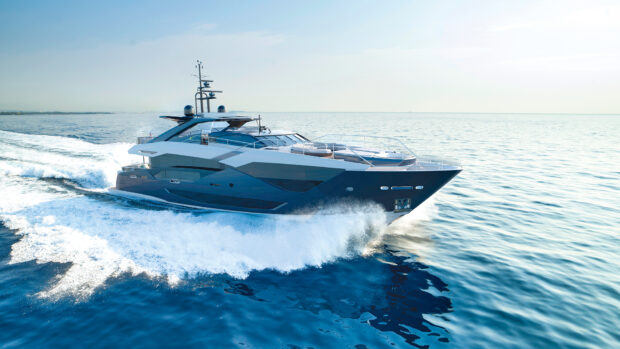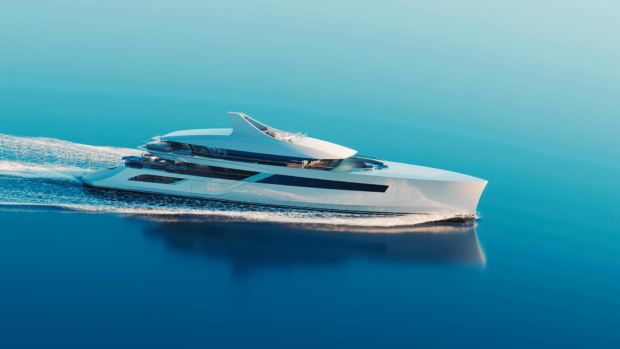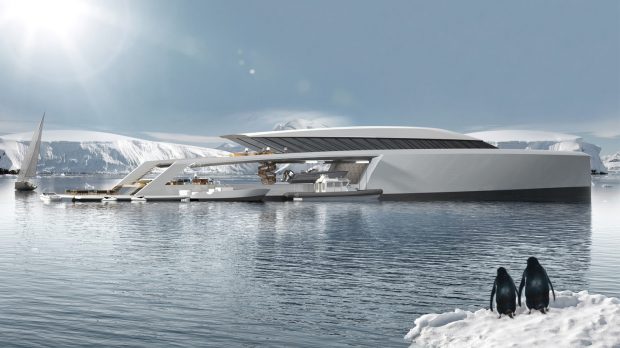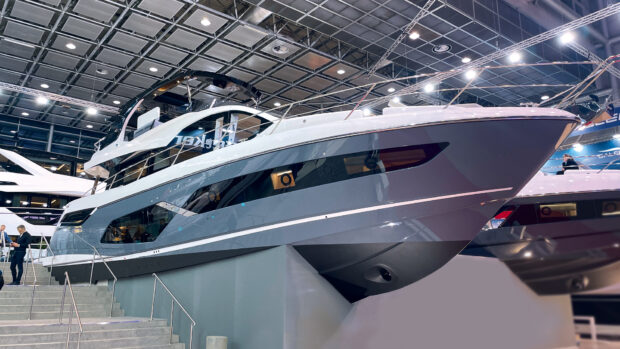The extraordinary adventures of Latitude include two successful attempts at the Northwest Passage and becoming the first superyacht to reach 82˚ North...
The Bellot Strait is a 20-mile-long, mile-wide shallow and winding canyon separating Somerset Island from the northernmost part of North America. It’s an alarming leg of the Northwest Passage, where the changeable current can rip through at up to eight knots, hurtling down ice on anyone crazy enough to be there.
If National Geographic ever produce a series called ‘Northwest Passage Nightmares’, it could do worse than start here. And yet, at one end of the strait, sat Latitude, a 45-metre steel and aluminium Vripack superyacht, with Captain Sean Meagher weighing up the options.
He needed to take a look in the tender at what was up ahead, so off he went, along with the yacht’s owner Anil Thadani, Anil’s cousin Ravi and son-in-law Lappo, and wildlife photographer John Issac.

Docking was sometimes a case of improvising
The conditions started to close in, and soon they realised that there they weren’t getting back to the mothership any time soon, with the ice gathering around them. They were now stuck on the opposite side of the canyon to Latitude. It was blizzard conditions.
“We were there for seven hours, with polar bears running around and staring at us,” Sean says, with a disarming nonchalance. “All we could do was wait and watch the current and the ice-floe.” Then he noticed that the ice around him was starting to compact.
“That meant the edge on the other side a quarter of a mile away was opening up. A little corridor appeared, about as wide as the tender. I told everyone to hold on and we went for the gap,” he says.
The tender – a 35ft Everglades in Kevlar with triple 350s (“that boat is a tank!”) – punched through the gap at 40 knots. It was just another chapter in the extraordinary voyages of Latitude.

Captain Sean on bear watch on Ragged Island
Even aboard a 21st-Century superyacht, there’s something very 19th Century about cruising at these latitudes. At least Sean and his guests were well prepared: “We were properly dressed, armed, we had food, and an Iridium sat phone.”
He recalls “a phenomenal piece of advice” from Captain Phil Walsh – a veteran of the Northwest Passage: “When you step into the tender, assume you are spending the night there, and equip yourself accordingly”.
It was, adds Sean, “something we lived by”, and it proved its worth in the Bellot Strait, when their only option was to wait it out and watch the polar bears.

Locals on a family outing
For centuries in the minds of mariners, the Northwest Passage was one of those mythological ocean regions that fired the imagination and chilled the blood in equal measure – a mare incognitum on the margins of the early charts, where there really might be dragons and sea serpents.
History books credit Sir John Franklin with the discovery of a route from the North Atlantic to the North Pacific in the 1840s, although neither he nor a single soul from his 120-strong party made it home. Roald Amundsen was the first to get through in 1905. Since then, only a handful of private craft have made the treacherous passage.

Latitude‘s sundeck became the ice deck at times
It takes a special captain and crew to get a superyacht with guests on board to successfully cruise the region, but also an owner with a vision and a sense of exploration. Sean joined the yacht in December 2013, when the current owner bought the yacht. Anil had come to Latitude in a number of steps, the last of which was a 92ft Pershing.
“He wanted to pull the trigger on something a little bigger, and was looking for a captain. A mutual friend recommended me, and that started the conversation with the owner.
Had he said: ‘I want to go to St Tropez and drink cocktails’, I wouldn’t have taken the job. What he actually said was: ‘I want to go on adventures and photograph wildlife’. That was it. I was in!”

There were stunning landscapes on the Northwest Passage
The planning for the Northwest Passage began in Latitude’s salon, with the nearest ‘chart’ available – an Ikea map of the world. “We were discussing where to take Latitude with the owner, and he suggested Alaska,” Sean says.
“I told him we could go via the Panama Canal, or I pointed to the Northwest Passage and said we could go this way. He looked at the map, looked at me, and said: ‘Yes! We have to do that!’”

There was plenty of time for fun…
With the decision taken, the only question now was planning and prep. “We were mid-refit,” says Sean. “We’d just replaced the sauna with a dive-room. Then we decided to go to the Arctic. After ten hours in sub-zero temperatures, I’d often ask myself: ‘Why on earth did we rip the sauna out?’”

…but a constant lookout was kept for real polar bears
Even though Latitude was a little rusty on the cruising front, the early impressions were good. “Our first cruise with the owner on board was out of New York, and we were heavily tested by the weather, but the yacht handled well.
After a couple weeks’ running around New England, I knew a couple of things needed sorting. We went into Delta in Seattle and sorted out a steering issue, and into Bay Ship & Yacht in California to realign the shafts. After this, we were a knot-and-a-half faster.”

Latitude in the ice at Ilullisat on Greenland
With the ship ready, the personal preparation could begin. “I looked around for guys who’d done this trip before. I found Captain Phil Walsh, formerly of Turmoil and now of Mogambo. I had a couple of hours chatting with him on the phone, and ended up flying to see him for a weekend,” Sean says.
“The equipment list I had prepared was pretty good, but he was able to suggest better Arctic suits, and recommended putting a bag filter over our watermakers because there is a lot of plankton and krill.”

The Northern Lights put on a show in Iceland
Another source of great advice was an experienced commercial ice pilot, Patrick Toomey. “He’s 81 years and full of experience. I called him, and explained what I wanted to do, and he asked me if I’d ever read the book Ice Navigation in Canadian Waters.
“I told him that I had, and that it was extremely well written. He said: ‘Good. I wrote it.’ I knew I’d found the right guy!”

The rugged 35ft Everglades tender was a highly practical tool
Patrick provided Sean with a wealth of experience. “You learn pretty quickly to instinctively appreciate how ice is moving,” says Sean. “But sometimes I needed Patrick’s advice because the best approach might be counter-intuitive. He was great at strategising a course through the ice-field.
“When we got back to Latitude in the Bellot Strait we had six to eight knots of current, and huge chunks of ice whipping at us. At the end, it was frozen solid, and I saw a gap in the ice by the cliff and was thinking about heading to break the ice there, but Patrick told me to aim for the centre of the channel, even though the ice is thicker at that point.
“Too close in and we ran the risk of being run up onto the land, he told me. You can pick up all sorts of techniques, like using your bow wave to push a chunk of ice out of the way. I even used to wedge a piece of ice the size of the yacht’s beam between the bow and the bulb, using it is a battering ram.”

Walruses in Dundas Harbour
What Latitude achieved in that first east-west run was one of the most remarkable superyacht adventures ever undertaken, in a season when despite the general reduction of ice in the region, the ice was at its worst for decades.
“It never occurred to be me that we wouldn’t make it. One of the fortunate things in this industry is that you get to work for guys who’ve beaten the odds and don’t take no for an answer. I guess that kind of rubs off,” says Sean.

Latitude had to take on some difficult waters
But cruising somewhere as alien and unfamiliar as this did have an effect on the crew. “We did 126 days straight. We were looking after guests, and the engineering guys were kept busy.
“By Vancouver, we were fried. I looked at everyone around the table in the mess, and it was like a scene from Das Boot! A friend asked me if I’d just got back from Iraq!”

Captain Sean with a humpback off Nova Scotia
Fried they may have been, but the adventures weren’t about to stop there. “At San Francisco, I was putting some itineraries together for the owner and it suddenly occurred to me that we had to go back.
“The owner’s response when I called him was: ‘What? Are you crazy?’ He went for it though, and so did the crew, and the experience we had gained the first time made it a lot less painful. We were veterans now, and it also helped that there was less ice.”

A polar bear on patrol
The available charts are “real sketchy”, according to Sean, with whole areas left blank. One part of the passage meant cruising along Amundsen’s original route (the planned route was full of ice). It needed some improvisation.
“We were using charts from the 1930s. Captain Phil Walsh reckoned that they were a thousand metres out. There was very little data to be had off them, but I thought that what little there was must have been surveyed close to land, where there were more likely to be reference points.
“So we went closer to land and we were able to make use of that small amount of reliable data.” Navigation was a case of using all the wheelhouse tools. “We had three chart plotting systems and the paper charts. Sometimes all four would disagree!” says Sean.

A reminder of how things can go wrong – a wreck on Bear Island
Latitude’s historic passage-making is continuing. This year they have become one of the only vessels to circumnavigate Svalbard, and the only superyacht to reach 82˚ North. Had Sean learned any lessons from the Northwest Passage that fed into the Svalbard cruise?
“Certainly, but there was a big difference, too. There were places to hide in the Northwest Passage, but Svalbard was just rough, nasty seas.”

Fifty knots of wind off Devon Island
When we talked to Sean last September he was on the brink of heading back to Boston for some much-anticipated R&R.
So is that it for adventuring? You can sense the excitement in his voice as he says: “I’ve just got off the phone with the owner. We’ve agreed on Antarctica.”
• A version of this story appeared in SuperYacht World Issue 52 and on SuperYachtWorld.com on January 20, 2017









